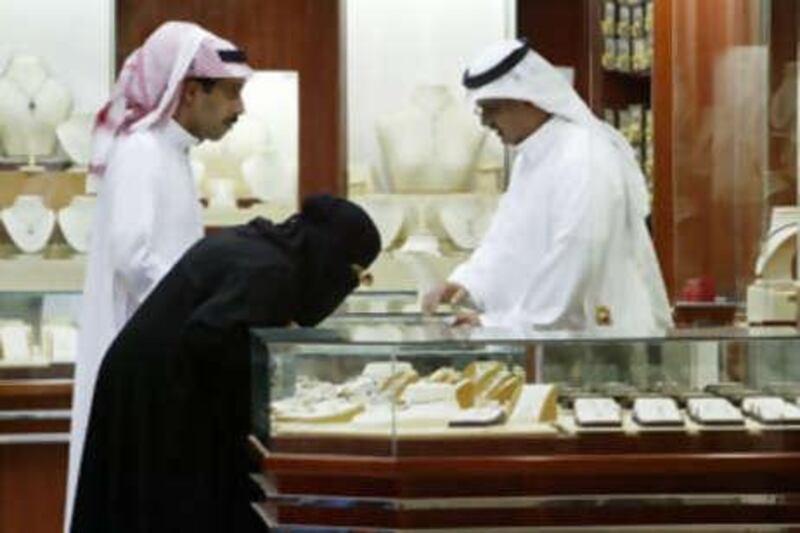DUBAI // Saudi Arabia, the largest gold jewellery consumer in the Middle East, faces a shortage of scrap as sellers stay away in anticipation of further price rises, industry professionals say. According to the World Gold Council, Saudi Arabia sells between 20 and 30 tonnes of scrap, or resold jewellery, per quarter to domestic and regional refineries. More consumers are turning to the precious metal as an investment as prices once again climb toward US$1,000 (Dh3,670) an ounce.
"Scrap actually adds to supply on the market, so if the price shoots up further and people stop selling their scrap, then there could be a supply crunch," said Swapna Nair, the general manager of the Dubai Gold and Jewellery Group (DGJG). "This could mean some bad news for the retailers who either resell the jewellery or send the scrap to be melted and make new jewellery." Gulf women are vigorous buyers of gold and are traditionally given jewellery at their weddings; many women are also acutely fashion conscious, traders say, and to keep up with the latest design styles, customers have their jewellery melted down and refashioned on a regular basis.
Earlier this year, traders said Saudi Arabia had virtually stopped exporting scrap gold. Similar slowdowns are also being reported in the UAE, and this news has given traders reason to celebrate. "Less scrap in the market is good news for us," said Ms Nair. "Over the past two days, 22 carat gold was at Dh108 ($29) per gram - I've never seen this before." Gold prices reached an all-time high of $1,030.80 an ounce on March 17 on soaring inflation rates and record high oil prices. Prices fell between 20 and 22 per cent in the first quarter of this year, according to DGJG, but have since turned around.
Gold prices touched $967.60 in Friday trading, the highest level since March 19. Some jewellers melt down the scrap gold, mostly old jewellery, into a solid bar, often a kilogram in weight, while others use it to make investment bars ranging from one to 100 grams (0.035 to 3.5 ounces), which are very popular among Indian people. Some industry insiders say the low level of gold resales is a sign the industry is thriving.
In Dubai, a long-established market for gold wholesale and retail jewellery, record high prices have led to a decrease in the flow of scrap gold coming into the emirate in recent months. While revenues for gold sales were up in the first quarter of this year, regional demand had slipped as market volatility sparked a slowdown. Traders the second quarter is already looking more positive as prices continue their climb back toward $1,000 an ounce. Investors often regard gold as a hedge against inflation and as an alternative investment to currencies and bonds.
"People see this as an investment, so it is only natural that they start buying when prices start going up again," said Manish Dhamani, the director of retail for Dhamani Jewellers. As gold is the precious metal of choice for jewellery in the Middle East and South Asia, retailers say the impact on their businesses is unlikely to be severe. Beyond serving as a discretionary purchase, many cultures regard gold as a status symbol, and use it as an offering at weddings or at the birth of a child.
"If anything, I think we will see better sales because people are more eager to invest in new jewellery," said Jayant Soni, the director of Lausanne Jewellers in Dubai. Some retailers describe the decrease of scrap jewellery as a temporary slowdown, adding that the various precious metals and stones typically compensate for one another when there is a slowdown in the sale and resale of a particular type of jewellery.
"Maybe if a retailer relies on gold for something like 95 per cent of his sales, then maybe he might suffer, but what we usually see is that when people slow down in buying gold, they buy other things, like diamonds or something," Mr Dhamani said. @Email:vsalama@thenational.ae * With Reuters





